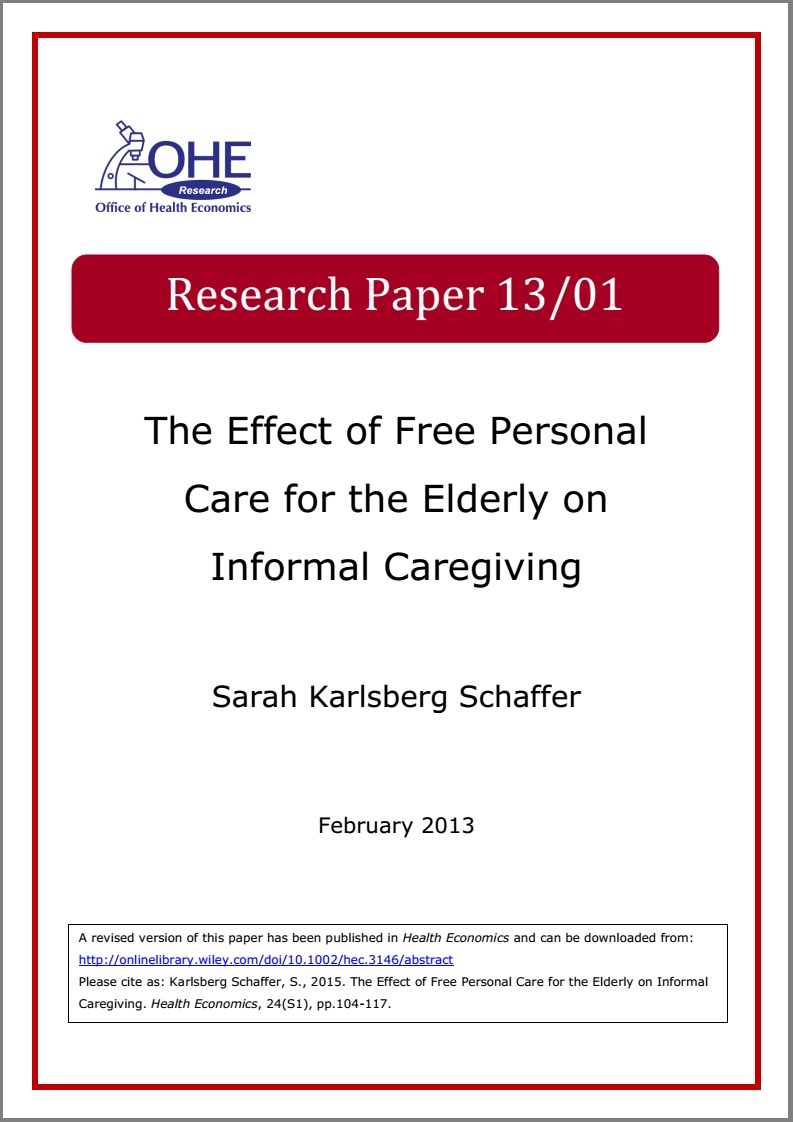Sign up to our newsletter Subscribe
The Effect of Free Personal Care for the Elderly on Informal Caregiving

Benjamin Franklin remarked in 1789 that ‘in this world nothing can be said to be certain, except death and taxes’. To these two certainties the economist would add that of the scarcity of resources, as ‘the central economic problem for society is how to reconcile the conflict between people’s virtually limitless desires for goods and services and the scarcity of resources (labour, machinery and raw materials) with which these goods and services can be produced’. This conflict is resolved by various methods of prioritisation, and textbooks often define economics as the study of the processes by which scarce resources are allocated between competing ends. Economic efficiency consists of maximising the outcomes from limited resources, and also of optimising the distribution of these outcomes according to society’s value systems.
In the case of health care, the innocuous process of resource allocation becomes a controversial and suspicious process of ‘rationing’, as scarce resources are allocated between the many and rapidly increasing number of health care interventions from which, hopefully, patients can benefit in terms of improved health status. The inevitability of some form of rationing in all health care systems shows economics living up to its reputation as the ‘dismal science’ as allocation decisions determine who is treated and who is left untreated, to live in pain or discomfort, or to die.
Alan Williams defines rationing in health care as occurring ‘when someone is denied (or simply not offered) an intervention that everyone agrees would do them some good and which they would like to have’. This process has existed throughout the life of the UK National Health Service (NHS). In the early decades of the service, rationing was undertaken quietly by doctors. In more recent decades, as public and professional realisation of scarcity in the NHS increased, the rationing debate has become more explicit. Scarcity of resources means that decisions to undertake a health care intervention incur an opportunity cost – the value that those resources would have provided had they been allocated in another way, to another patient.
Thus the policy issue is not whether resources have to be rationed, that is unavoidable and ubiquitous, but how: what principles should determine patient access to health care and how should they be applied? This harsh reality can be mitigated, but never removed, by increased spending on health care and by improving the efficiency of use of these resources. New Labour’s ‘£21 billion’ spending increase announced in the summer of 1998 (in reality less than £9 billion in England) will not eliminate waiting lists in the UK NHS and meet all other capital and service needs: it will merely ease the suffering of some and leave others to wait for better services. Similarly persuading doctors to reduce marked practice variations and ineffective treatments will release some resources but still leave decision makers rationing care locally throughout the NHS.
There are advantages and disadvantages of moving from the present implicit system of rationing, with local discretion (rationing by post code) to explicit rationing. Doyal has argued that explicit criteria are essential for ‘the moral management of health care’. Keeping rationing criteria from patients may make clinicians’ lives easier, but it is not in the best interests of patients or taxpayers. Those opposing explicit rationing emphasise the difficulties of implementing any system, and the conflict created by denying care to patients. Implicit rationing, and its associated equivocation, may enhance satisfaction more than harsh explicitness. Coast argues for evaluation of these issues before ‘jumping on the bandwagon of explicit rationing.’ Despite such arguments, the assumption made in this paper is that the benefits of explicitness, in terms of public rights and provider accountability, outweigh the costs. This judgement needs continued testing as rationing criteria develop.
Some would argue that the best way to address rationing problems is to leave it to doctors to determine treatment priorities. Unfortunately this approach may be inequitable (doctors offer very different treatments to similar patients) and inefficient (doctors may provide inappropriate and cost ineffective treatments to patients). Doctors, and other decision makers, need to work to explicit criteria and be managed in relation to them so that performance is judged systematically.
This paper considers the principles which could be used to determine rationing in health care, and examines critically the practice of rationing in various countries. This discussion demonstrates clearly both the need to have explicit principles which determine patient access to care and to have an evidence base to inform rationing decisions in all health care systems. Perhaps only when rationing is explicit will patients be empowered to question practice, and will practitioners be managed scientifically and enabled to give evidence based answers to the issue of who gets what treatments and why in the NHS.